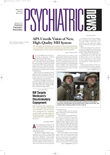APA has joined a coalition of six mental health advocacy groups that oppose the Child Medication Safety Act (HR 1170) because it would base federal funding for schools on the requirement that they establish policies and procedures to implement the bill’s provisions.
The coalition is concerned that the risk of losing school funding would have a chilling effect on school personnel who wish to communicate to families about students with mental health problems.
The bill, introduced in March by Rep. Max Burns (R-Ga.), has the support of several leading Republicans in the House of Representatives including its Speaker, Rep. Dennis Hastert (R-Ill.).
The other five coalition members are Children and Adults With Attention-Deficit/Hyperactivity Disorder (CHADD), American Academy of Child and Adolescent Psychiatry, Federation of Families for Children’s Mental Health, National Alliance for the Mentally Ill, and National Mental Health Association.
One controversial provision of the bill is that public school personnel, including teachers, cannot require students to take methylphenidate or other Schedule II controlled substances as a condition of attending school. The coalition questions whether that provision is necessary “because we are aware of only a handful of cases where parents [allege that they] were coerced by local school personnel into obtaining psychiatric prescriptions for their children. These incidents were addressed by state legislators or school boards,” said CHADD Chief Executive Director Clarke Ross in an interview with Psychiatric News.
For example, Patricia Weathers, who lives in upstate New York, testified at a hearing last year held by Rep. Dan Burton (R-Ind.), former chair of the Committee on Education and the Workforce and a cosponsor of HR 1170. Weathers contended that she and her husband were coerced by school officials into putting their son on psychiatric medications, from which he suffered severe adverse side effects (Psychiatric News, November 1, 2002).
“While this event was unfortunate, it was addressed by the New York State Department of Education in its policies and procedures barring school personnel from recommending psychiatric medications to parents,” said Clarke.
The coalition wants to ensure that public school teachers can still recommend a comprehensive medical assessment by persons licensed to perform such evaluations. “The vital role that teachers play in providing observations to diagnosing professionals cannot be underestimated,” the coalition maintains.
Clarke added, “Just remember that the Citizen’s Commission for Human Rights [CCHR] is behind the bill and is opposed to children being on any psychiatric medications,” said Clarke. The CCHR is affiliated with the Church of Scientology.
Last month the coalition sent letters to the House cosponsors of the legislation and members of the House Committee on Education and the Workforce, including chair Rep. John Boehner, (R-Ohio). The letters urged them to focus their legislative efforts on the “unmet needs of children with mental disorders and their families and the current mental health crisis plaguing our country.”
HR 1170 was inserted as an amendment to the comprehensive Individuals With Disabilities Education Act (IDEA) reauthorization bill (HR 1350), which passed the House of Representatives last month. The Senate Health, Education, Labor, and Pensions Committee plans to introduce its own IDEA reauthorization bill this month.
“The Senate has a history of being more deliberative than the House on health care bills, so our hope is that the medication amendment will not pass the Senate,” said Clarke.
The text of the Child Medication Safety Act can be accessed on the Web at http://thomas.loc.gov by searching on the bill number, HR 1170. ▪
